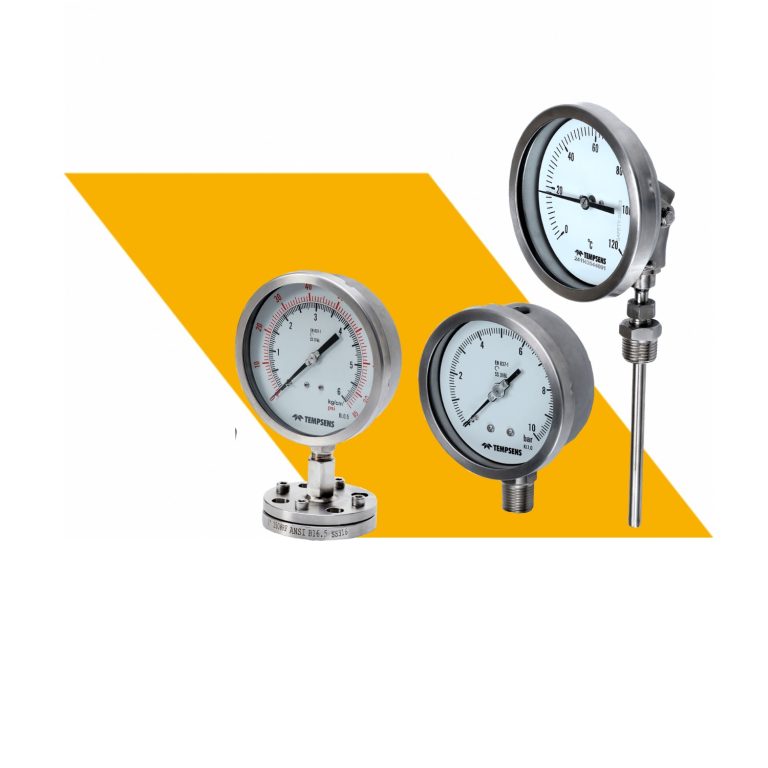A temperature gauge is a tool that detects and displays the temperature of a material and environment. They provide accurate temperature readings across various applications, ensuring safety and optimizing performance. Their precision and reliability make them indispensable for quality control and process regulation.
Temperature gauges are important in ensuring product standards and operational safety in industries such as manufacturing, chemical processing, and food production, making them crucial tools in routine and complex processes. Let us dive into the blog to know why temperature gauges are essential for industrial processes.
Process Control and Consistency
One of the primary reasons temperature gauges are used in industrial settings is to ensure process control. Most industrial processes are extremely sensitive to temperature fluctuations. Many reactions occur only at specified temperature ranges.
If a reaction vessel overheats or cools below its ideal temperature, it may result in an incomplete response or even an explosion. The temperature gauges help the operators to find the problems in the earlier stage.
An accurate temperature control assures consistency in product quality in sectors like food processing and medicines. The temperature changes can affect the taste and texture of the product. Effective control is essential for better outcomes.
Safety Assurance
Equipment that operates in extremely hot conditions is common in industrial settings. These systems can become dangerous if the temperature is not properly monitored. The boilers and pressure vessels need frequent monitoring at refineries and power plants.
The consequences of these systems overheating coils result in explosions and fires. Temperature gauges serve as the first line of protection by warning operators of unusual thermal conditions before they become dangerous.
Making sure that goods or materials don’t go above a specific cold threshold is crucial for both cryogenic applications and cold chain logistics. If biological samples and vaccines are not stored in a proper place they may become dangerous.
Energy Efficiency and Cost Reduction
The capacity to track and optimize energy use is a significant benefit of employing temperature gauges in industrial operations. Achieving the ideal temperature effectively necessitates avoiding overheating and underheating.
Heating furnaces in a metal forging factory over the necessary temperature might reduce the lifespan of the furnace. Regular temperature reduces the chance of material loss or rework while improving product quality.
The temperature gauges are therefore essential to achieve operating efficiency. It is the major benefit of using temperature gauges for industrial processes.
Equipment Longevity
Temperature gauges are essential for maintaining equipment lifespan in industrial processes. If not maintained properly, it can result in overheating, damage, or failure. Temperature gauges help to maintain appropriate temperature conditions by reducing wear and strain.
They reduce the chance of malfunctions and costly repairs by maintaining machinery within acceptable temperature ranges. Regular monitoring helps to increase the lifespan of the equipment.
Continuous temperature regulation can result in less downtime and smoother operation. The temperature gauge plays a major role in improving the efficiency of the industry.
Types of Temperature Gauges
● Bimetallic Temperature Gauges
Bimetallic gauges work at different rates when heated. These metals are joined together and wound into a coil. As the temperature varies, the coil bends, moving a needle on a display to show the temperature. These gauges are widely used in HVAC systems and industrial machines due to their longevity and simplicity.
● Gas Actuated Temperature Gauges
These gauges employ a gas-filled bulb linked to a pressure-sensitive tube. When the temperature varies, so does the pressure inside the gas bulb, which causes the pointer to move. Gas-actuated gauges are highly accurate and suitable for long-distance temperature measurement.
● Liquid-filled Temperature Gauges
These gauges are filled with a liquid, typically alcohol or silicone, that expands when heated. The liquid expansion moves the needle, indicating the temperature. These are commonly utilized in difficult situations with vibration and wetness because the liquid dampens needle movement.
● Resistance Temperature Detectors
RTDs measure temperature by detecting the resistance change of metals (often platinum) with temperature. They are extremely and commonly utilized in laboratories and precision industrial applications.
● Thermocouples
Thermocouples are made up of two distinct metals linked together at one end. When heated, they generate a voltage proportional to the temperature. They are commonly used because of their wide temperature range and rapid response time.
Wrapping It Up
Temperature gauges are essential equipment for industrial operations. They uphold process precision, guarantee the safety of personnel and equipment, enhance energy efficiency, and facilitate regulatory compliance. They enable industries to operate efficiently, securely, and sustainably by giving them real-time knowledge and control over temperature.
If you are looking for temperature gauges to resell in bulk, Tempsens comes as the best option. We offer the best quality products to our clients. We deliver temperature gauges to various countries worldwide. Make use of our service and gain more profit by selling our products.

